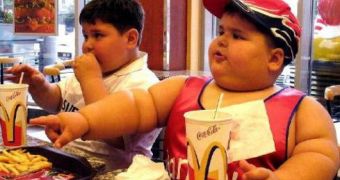This is one of the most shameful mental addictions induced in children. A new research shows that anything bearing the McDonald's mark tastes better for children, a vivid example of the way advertising can fool the taste buds even in young children.
Comparing food from McDonald's to that in plain wrappers, McDonald's foods always win, even if the bags contain carrots, milk and apple juice (you won't find these with a McDonald's label!).
"You see a McDonald's label and kids start salivating. It is the first study I know of that has shown so simply and clearly what's going on with (marketing to) young children." said Diane Levin, a childhood development specialist who campaigns against advertising to kids, not involved in this study.
"Kids' perception of taste was physically altered by the branding. It was remarkable how children so young were already so influenced by advertising." said study author Dr. Tom Robinson.
The research was made on 63 low-income children ages 3 to 5 from Head Start centers in San Mateo County, California, but the team believes the results would have been the same for kids coming from wealthier families.
Last month 11 major food and drink companies, including McDonald's, announced new strategies for tackling with children under 12. McDonald's stated the only Happy Meals it will promote to young children will have fruit and less fat.
"This is an important subject and McDonald's has been actively addressing it for quite some time. We've always wanted to be part of the solution and we are providing solutions." said company spokesman Walt Riker.
"It's an amazing study and it's very sad. Advertisers have tried to do exactly what this study is talking about -- to brand younger and younger children, to instill in them an almost obsessional desire for a particular brand-name product," said Dr. Victor Strasburger, an author of an American Academy of Pediatrics.
Only 2 out of the 63 children told they'd never eaten at McDonald's and around 30 % ate there at least once weekly. For the majority the McDonald's logo was familiar, but it was presented to those who didn't.
The team used three McDonald's menu items (hamburgers, chicken nuggets and French fries) and store-bought milk, apple juice and carrots. Children received two identical samples of each food, one in McDonald's wrappers and the other in unmarked ones. They had to score the taste of the foods. (Some children didn't taste all the foods they received).
McDonald's-labeled samples won detachedly. French fries were the champions; almost 77 % said the labeled McDonald's fries tasted best compared to 13 % who preferred the unlabeled McDonald's fries.
54 % preferred McDonald's-wrapped carrots versus 23 % who enjoyed them plain-wrapped.
The hamburgers' consumption seems not to have been influenced too much by labeling: 29 kids chose McDonald's-wrapped burgers and 22 the unlabeled ones. Less than 25 % of the children said both samples of labeled and unlabeled foods tasted the same.
"A fairer comparison might have gauged kids' preferences for the McDonald's label versus another familiar brand, such as Mickey Mouse. I don't think you can necessarily hold this against McDonald's, since the goal of marketing is to build familiarity and sell products. Parents play a strong role in controlling food choices for children so young." said Pradeep Chintagunta, a University of Chicago marketing professor.
Robinson disagrees.
"Because young children are unaware of the persuasive intent of marketing, it is an unfair playing field".

 14 DAY TRIAL //
14 DAY TRIAL //